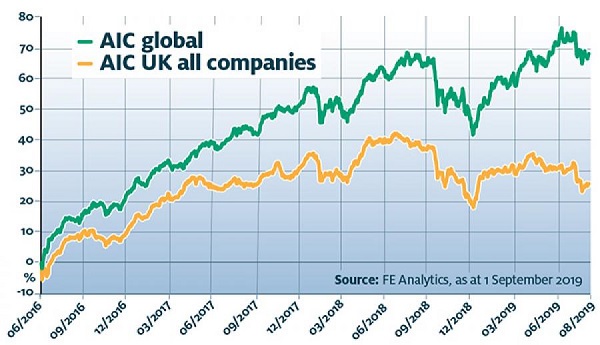How to play the loathed UK with investment trusts
Ahead of the Brexit deadline, some fund managers are adopting a bold approach.
4th October 2019 15:49
by Fiona Hamilton from interactive investor
Ahead of the Brexit deadline, some fund managers are adopting a bold approach.

Optimism is hard to find in investment circles at present, but as the late Sir John Templeton famously said: "The time of maximum pessimism is the best time to buy". That brings us to the UK, which has for a couple of years now been among the most loathed of regions, by both domestic and international investors.
The UK stock market has struggled since the 2016 Brexit vote. Growing uncertainty over the outcome has undermined sterling, persuading most international investors to slash their UK exposure. Many UK investors, including pension funds and global investment trusts, have followed suit. As a result, even the multinationals which dominate the FTSE 100 index are trading on lower multiples than their overseas peers, and the more domestically oriented UK companies are lower still.
Lagging behind
As the chart shows, UK trusts have notably underperformed global trusts since 24 June 2016. The average trust in the AIC UK all companies sector is up 25.9% over the period to the end of August, whereas the average trust in the AIC global sector has fared much better, with a gain of 68%.
Almost the only UK trusts to have achieved positive returns over the last year are a small group which have double-digit exposure to international companies plus a focus on quality growth companies, rather than being seduced by high yields. They are Finsbury Growth & Income (LSE:FGT), Troy Income & Growth (LSE:TIGT), Murray Income (LSE:MUT), and its sister trust Dunedin Income Growth (LSE:DIG). With the exception of Dunedin Income Growth, which is 7% geared, they are cautiously positioned, with no gearing or net cash.
For a more optimistic stance you need to turn to some of the value-oriented managers, who have struggled in recent years, but who believe the tide must eventually turn in their favour. James Henderson, who manages Law Debenture (LSE:LWDB), Lowland (LSE:LWI) and Henderson Opportunities (LSE:HOT), is among them. He believes UK shares are now so undervalued relative to their overseas counterparts that he has reduced Law Debenture's US and Far East holdings and increased its UK weighting from 70% to 78% this year, and expects to take it over 80%.
UK trusts underperform global

Low multiples
Henderson is buying UK companies on lowly price-to-earnings ratios of between 8 and 12 compared to 20 plus on similar overseas companies, and often achieving a sizeable increase in yield in the process. Recent purchases have included Land Securities (LSE:LAND), Hammerson (LSE:HMSO) and various industrials, with Henderson noting that "the global economy is still growing and companies selling overseas are advantaged by the low pound". He adds that foreign investors and private equity have started to recognise the value on offer, as evidenced by recent bids at large premiums for Cobham (LSE:COB) and Greene King (LSE:GNK), and he expects funds to start flowing back into UK equities once Brexit is out of the way.
Lowland has no international holdings, but its weighting in the multinational rich FTSE 100 has recently been close to its all-time high at 45%. "It has not been high enough (to protect the portfolio)," Henderson concedes. But he is sticking to his guns.
Simon Gergel, who manages Merchants Trust, is another value-oriented manager who thinks the UK market is massively undervalued, and that within the UK there is an excessively wide valuation gap between "good quality multinationals" like Diageo (LSE:DGE) and Unilever (LSE:ULVR) and companies which have had the odd issue but are now performing well, such as Balfour Beatty (LSE:BBY) and Tyman (LSE:TYMN).
"The differences (in valuation) are as wide as in the late 1990s, when anything remotely associated with the internet was on huge multiples whereas everything else was far cheaper," says Gergel.
He adds: "While this trend has made shorter-term performance difficult for our investment style, it is providing numerous opportunities for us to invest in good companies trading at exceptional prices." He has therefore raised Merchant's gearing to nearly 19%.
Gergel hopes for certainty on Brexit. "Investors can cope with difficult environments if they can quantify and understand them," he says.
This article was originally published in our sister magazine Money Observer, which ceased publication in August 2020.
These articles are provided for information purposes only. Occasionally, an opinion about whether to buy or sell a specific investment may be provided by third parties. The content is not intended to be a personal recommendation to buy or sell any financial instrument or product, or to adopt any investment strategy as it is not provided based on an assessment of your investing knowledge and experience, your financial situation or your investment objectives. The value of your investments, and the income derived from them, may go down as well as up. You may not get back all the money that you invest. The investments referred to in this article may not be suitable for all investors, and if in doubt, an investor should seek advice from a qualified investment adviser.
Full performance can be found on the company or index summary page on the interactive investor website. Simply click on the company's or index name highlighted in the article.
These articles are provided for information purposes only. Occasionally, an opinion about whether to buy or sell a specific investment may be provided by third parties. The content is not intended to be a personal recommendation to buy or sell any financial instrument or product, or to adopt any investment strategy as it is not provided based on an assessment of your investing knowledge and experience, your financial situation or your investment objectives. The value of your investments, and the income derived from them, may go down as well as up. You may not get back all the money that you invest. The investments referred to in this article may not be suitable for all investors, and if in doubt, an investor should seek advice from a qualified investment adviser.
Full performance can be found on the company or index summary page on the interactive investor website. Simply click on the company's or index name highlighted in the article.